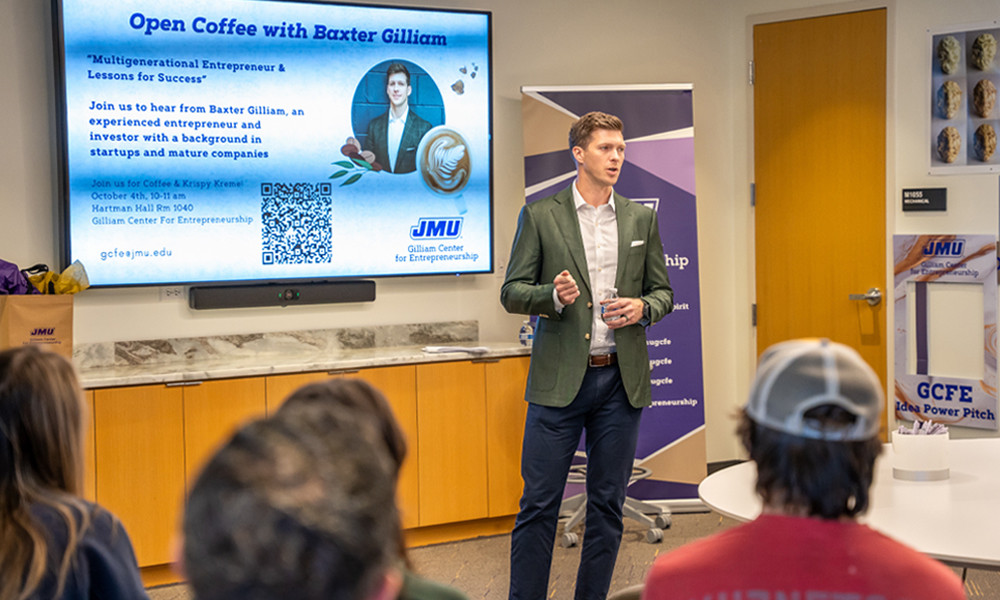Baxter Gilliam shares lessons learned as multi-generational entrepreneur
News
SUMMARY: In remarks at the GCFE’s October “open coffee,” Baxter Gilliam listed some of his prerequisites for business success.
“Surrounding yourself with people who are good at things you’re not good at” is essential to the launch of a successful business, according to Baxter Gilliam.
The second-generation entrepreneur – son of the Gilliam Center for Entrepreneurship’s namesake, the late Leslie Flanary Gilliam (’82) – was the guest speaker on October 4 for the GCFE’s monthly "open coffee."
Baxter devoted his talk’s preamble to the story of his father, Richard Gilliam Sr., a former apple-grower who rose to become a coal-mining legend. The elder Gilliam got his start in the mining business in the early-to-mid-’70s, as the Arab oil embargo was casting a long shadow over the economy’s energy sector. Almost overnight, oil and gas supplies dried up, and the price of coal soared from six dollars per ton to more than 30.
“It was a rags-to-riches story,” Baxter said, for more than a few orchard-owners in the tiny mountain towns of southwest Virginia. One of them was his father, whose tenacity and canny maneuvering enabled him to prosper as the founder of Cumberland Resources.
When Baxter asked his father to name the keys to business success, he was told three things straightaway:
- Hire people who are the best in the business – people who are smarter than you and know things you don’t know.
- “Align your incentives from top to bottom,” by which his dad meant that everyone needs to receive a reward – either in the form of commensurate compensation or a penalty for non-performance.
- Listen to everyone who has testimony to give, because “you never know where the next great idea is going to come from.”
Nor did Gilliam Senior hesitate when asked to list the business accomplishments of which he is most proud:
- Avoiding significant debt.
- Never having to lay off an employee – which in a cyclical industry such as coal exploration and extraction “is a huge accomplishment,” Baxter notes.
- Upon selling the company, reserving more than 10 percent of the proceeds and distributing it in the form of a bonus to the entire base of rank-and-file employees.
Baxter also shared a brief version of his own story, drawing on his decade-plus of experience as an entrepreneur and investor with interests that span both new and established companies.
After investing in startups, working for them, and even launching one himself, Baxter remains in active pursuit of his entrepreneurial journey. He currently serves as the Chief Information Officer and Chief People Officer at Alton Lane, a Richmond-based custom-tailored menswear brand. He also oversees the company's marketing activities.
Demonstrating that he is indeed cut from the same cloth as his single-minded father, Baxter emphasized that success as an entrepreneur is hard-earned and often takes years to achieve. His multiple roles at Alton Lane highlight his versatility, a valuable trait in early-stage companies where the ability to wear more than one hat is often essential.
Baxter says that his experience at Alton Lane has impressed upon him the importance of building consensus. “Different things work for different people,” he says, which for the entrepreneur means learning to navigate uncharted waters.
The success of a start-up venture also involves recognizing, Baxter says, that the business color-palette contains “a significant amount of gray.”
For many of the entrepreneurs who come to their nascent businesses with a Type A personality, Baxter says, “being right is very important.” He says he’s learned, however, that “being right isn’t the most important thing – accomplishing the goal is.”
Sometimes, he says, “it’s more important to let someone else solve a problem – especially if it’s not super-consequential to you in the long run.”
Also essential, in Baxter’s view, is to “fail fast.” It’s vital, he says, to receive and internalize as quickly as possible whatever negative feedback the market may be giving you and your idea.
